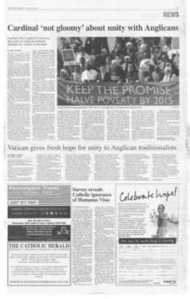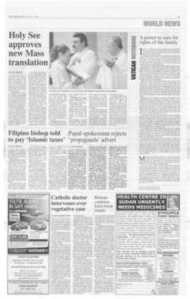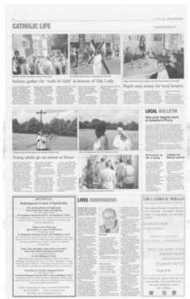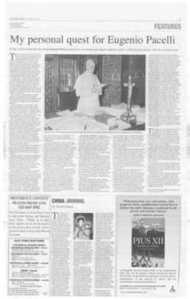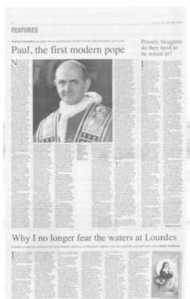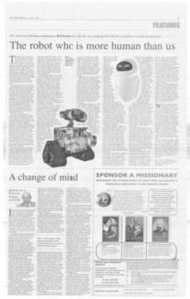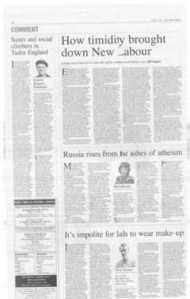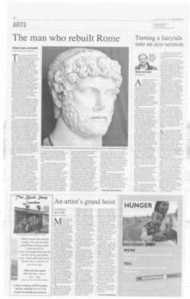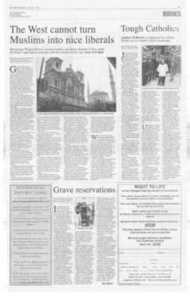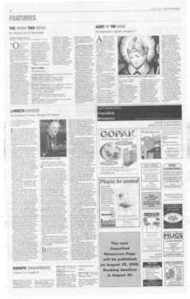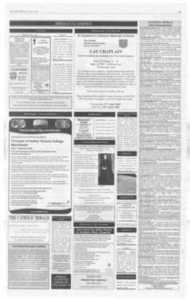Page 14, 1st August 2008
Page 14
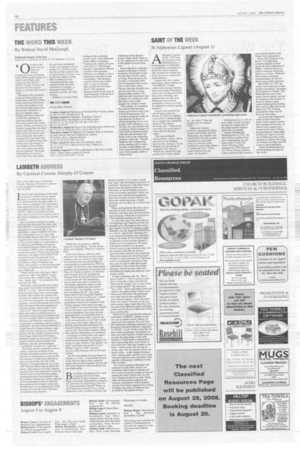
Report an error
Noticed an error on this page?If you've noticed an error in this article please click here to report it.
Tags
Share
Related articles
Vatican Position For London Priest
Local Bulletin
Cardinal To Attend Health Seminar
Local Unity Urged After Lambeth Vote
Cardinal Gets Tough In Lent
LAMBETH ADDRESS
By Cardinal Cormac Murphy-O'Connor
This is the edited text of Cardinal Cormac Murphy-O'Connor 's address at the Lambeth Conference on July 25 2008
Iwant to take advantage of this kind invitation to reflect on my experiences: of what has been going on over these last four decades while we have been in dialogue with each other, and especially in the years when I was intimately involved in the work of ARCIC. There are people on both sides who have become sceptical about this whole enterprise. but I am not one of them.
First. a bit about myself. I've been involved with the search for unity, and with ARCIC's work in particular, for a large part of my priestly life. I was appointed co-chair of ARCIC 26 years ago and presided over its work with Bishop Mark Santer until 1999. After I stepped down, I have continued to be involved: particularly as a participant in the Mississauga Meeting of Anglican and Catholic bishops which took place in Canada in 2000; and by attempting to implement some of what came from that meeting in the shape of the IARCCUM commission and the proposals in its document, Growing Together in Unity and Mission. Here in England and Wales, for example, we had the first joint meeting of Anglican and Catholic bishops a while ago.
When I look back at the time when I started my work with ARCIC it sometimes seems like a different age. They were "heady days". You remember this was back in 1982...
Back then, many people were expecting a quick and positive evaluation of ARCIC l's work — after all, the initial hope had been that some concrete intermediate steps on the way towards full communion might result. We were early on in this new enterprise of ecumenical dialogue — and maybe people had not yet fully reckoned with what reception of such documents might require. Even "high-level" official reception takes time, and it did. A careful process of discussion in the provinces prepared the way for Lambeth 1988 to recognise the Eucharist and Ministry statements as "consonant in substance with the faith of Anglicans" and the work on Authority as a good basis for further dialogue, especially over the concept of a universal primacy. In the Catholic Church it took even longer before the full Catholic Response came out at the end of 1991 — largely positive about Eucharist and Ministry, and also acknowledging "remarkable" progress on "authority".
One thing we have gradually come to realise is that the reception of any dialogue document involves far more than just its publication or even an official response. It takes time and discussion at every level of the life of the Church, as the path taken by your own 1997 Virginia Report and its proposals shows. And some or all of the contents can prove not to be accepted or received. I know some of our Christian partner communions have had anxieties when the Catholic Church has closely analysed or even questioned some of what has been proposed in dialogue statements. But that has to be an integral part of the process of receiving what a dialogue commission may propose. While this was going on, ARCIC began its second phase — but the atmosphere was changing. What do I mean by that?
In several respects, when we look back now we can easily see how much in those years was positive: Pope John Paul produced his encyclical letter on commitment to ecumenism in 1995, for example, the first time such authoritative teaching on ecumenism was given by the Pope. As I hope you know. it is full of a zeal for unity, and rich perspectives flowing from the Second Vatican Council that people are still unpacking a dozen years later; and it contains his remarkable appeal for others to enter into dialogue about how his Petrine ministry may "accomplish a service of love recognised by ail". Two years before that he had issued the Catholic Church's Ecumenical Directory, a handbook full of the key principles and guidelines to help every member of the Church engage in the search for unity and I believe we remain the only Church to have produced such a thorough and positive handbook. And what we had applauded here in Canterbury back in May 1982 revealed what would be one of the main priorities in the Pope's many visits across the world: while he was healthy, and even after he became ill. Pope John Paul met, got to know, and prayed with other Church leaders. Meetings with the Archbishop of Canterbury — seemingly so daring and even controversial back at the outset — have as a result become fraternal and frequent. No longer are they limited to the solemn "set piece" meetings such as that of Archbishop Coggan in 1987, but have become more informal and increasingly normal.
But the atmosphere had also begun to change, as I said — we gradually became aware that the path to unity might be longer than we had imagined at first, and that some shadows were spreading over • our relationship...
But I think something else is now emerging which has been hidden in these shadows, something even more fundamental, which is the question of ecclesiology. How do we understand the Church? Where is the Church to be found? Is it a loose federation with a common history and
family kinship? Is it a more closely knit body with developed structures of authority? Moreover. with what instruments does the Spirit enable the Churches to reach binding decisions where necessary. decisions which can provide clear and focused guidance about the Gospel of Jesus Christ, and about the moral decisions church members face as they try to follow the Gospel?
These, and questions like them, have emerged in most of our ecumenical dialogues and they have become increasingly pressing within the ecclesial lives of our dialogue partners as well...
It is 40 years since The Malta Report set Anglicans and Catholics on the way towards unity. Throughout these years the Catholic Church has always sought dialogue with the Anglican Communion as a whole, with all the challenge that your treasured diversity can sometimes bring to the table. So our Church takes no pleasure at all to see the current strains in your communion. We have committed ourselves to a journey towards unity, so new tensions only slow the progress. But they do seem to concern matters that are very important. These discussions are about the degree of unity in faith necessary for Christians to be in communion. not least so that they may be able to offer the Gospel confidently to the world. Our future dialogue will not be easy until such fundamental matters are resolved, with greater clarity.
People sometimes ask me: "Has it been worth it?"; "You've given a great deal of your life to this work and yet where are the results? Are we any closer yet to being united?" My answer is: "Yes, it has." I have said many times that I believe the path to unity is like a mad with no exit for those who genuinely seek unity and are also seeking the conversion it requires. That's because I know it is Christ's will that we be one, and however long it takes that has to be our goal. Pope Benedict again and again comes back to this as at the heart of what he is working for.
Moreover, I am sure that the dialogue statements of ARCIC, whether or not they are accepted in their entirety. do signal real convergence. We now have the substantial consensus between us on Eucharist and about Ministry, indicated by ARC1C's work. To the extent that we have achieved genuine convergence in these and other matters, to that extent we are also drawing nearer to the truth together. If truth really is expressed in these agreements they must sooner or later bear fruit. They are "money in the bank", whose value will one day be clearly seen. We can already notice one result of this — in the changed relationships of these years, and the ways Anglicans and Catholics can sometimes work together with greater confidence in the faith we share.
So I am not gloomy. Dialogue will continue in some form. Even if we sometimes find it hard to discem just how to go forward we cannot give up on seeking the unity Christ wills. As The Gift of Authority puts it so well: "Only when all believers are united in the common celebration of the Eucharist will the God whose purpose it is to bring all things into unity in Christ be truly glorified by the pe6ple of God."
blog comments powered by Disqus




